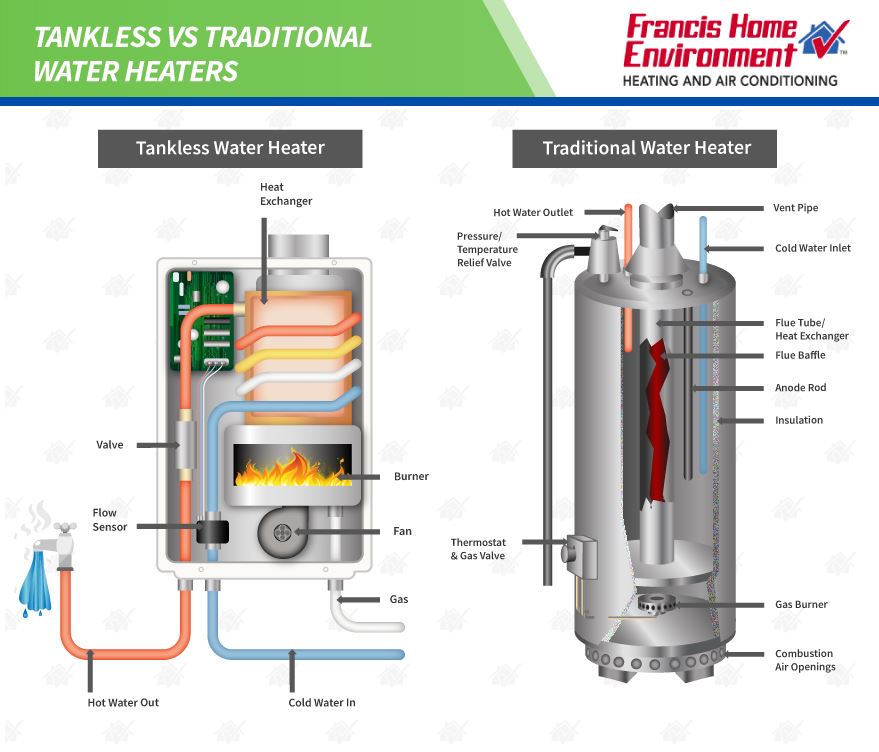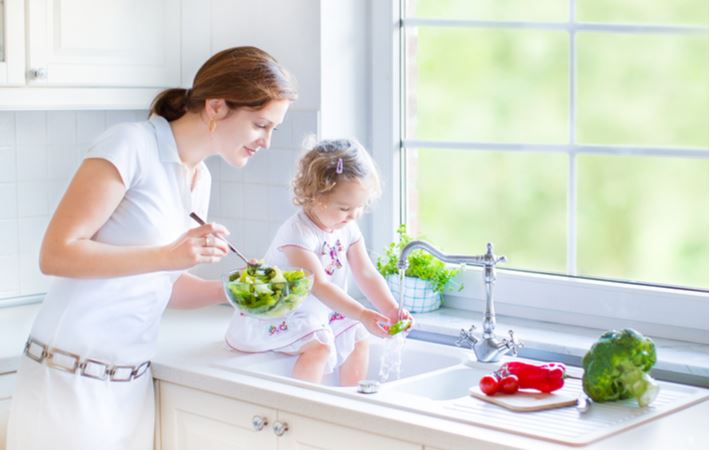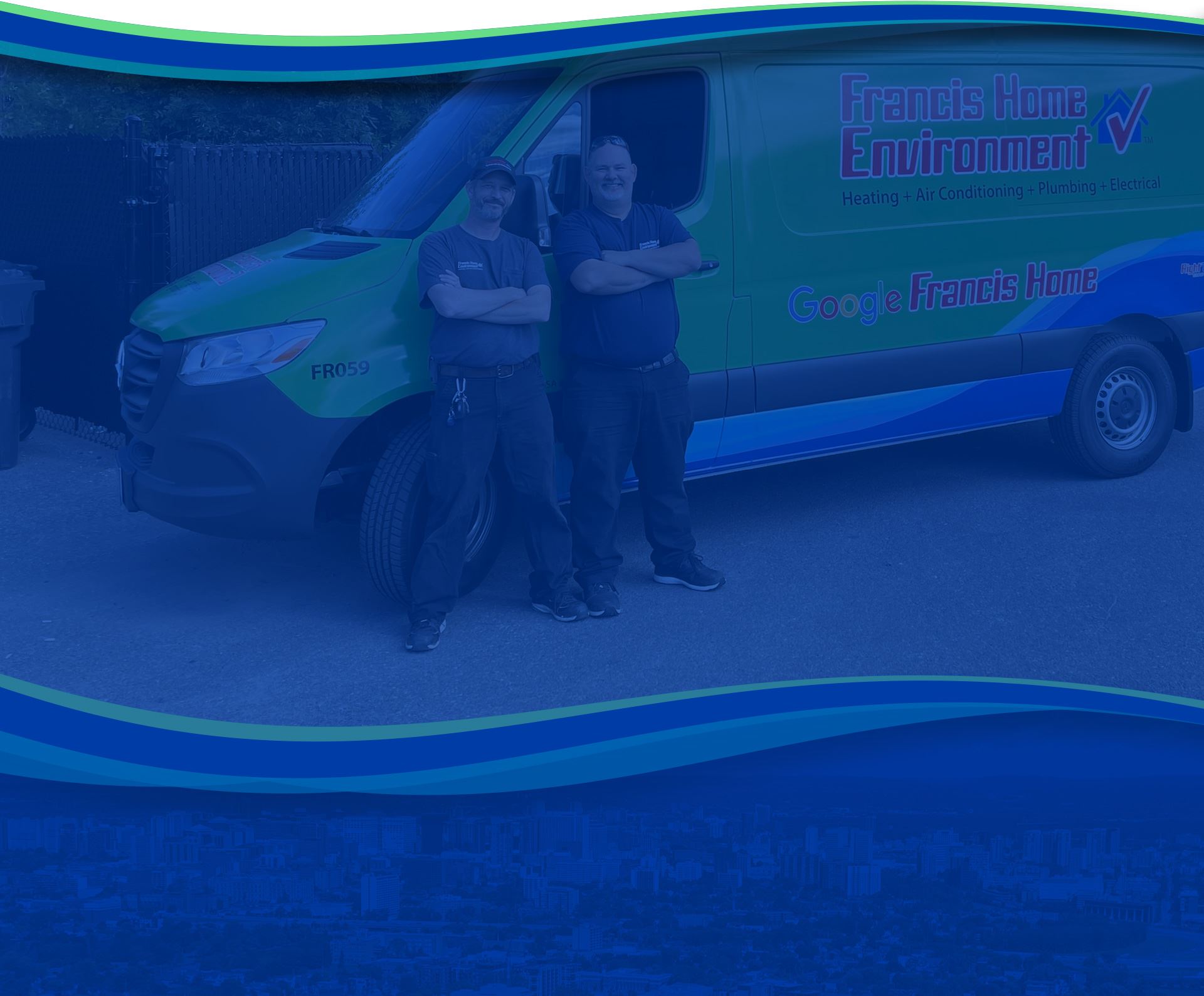Choosing the Right Water Heater for Your Needs
You likely don’t think about your water heater a lot unless it isn’t meeting your needs. There’s nothing worse than hopping in the shower and realizing there isn’t any hot water left. To help you avoid situations like this, it’s important to choose the right size and style of water heater to suit your family’s needs.
Types of Water Heaters
Water heaters come in a variety of styles, sizes, and fuel types.
Different Fuel Types
Water heaters fall into three categories based on fuel type: electric, natural gas, and propane. If you’re considering upgrading your current water heater or need to select a style for your new home, you should consider which fuel source is best suited to your needs.
Which fuel source you decide on may depend on what is available (for example, not all communities offer natural gas options) and the average price of each type of fuel in your region.
Traditional vs. Tankless
The next question you need to ask yourself is whether you are looking at a traditional style water heater with a tank or considering a tankless option.
Both traditional and tankless water heaters have their benefits and drawbacks.
Traditional Water Heaters:
- Cost less upfront than tankless units, but aren’t as efficient, so your fuel bill will be higher.
- Are easier to install, resulting in lower installation costs.
- Are simpler than tankless units, so generally, they require less maintenance over time. This helps keep costs low.
- Can provide your family with large volumes of hot water, but once that water is used up, it takes a while for the unit to produce more hot water.
Tankless Water Heaters:
- Cost more upfront, but are more efficient, so end up saving you money over time. However, you will still need to have regular maintenance performed to remove sediment buildup.
- Have a longer average lifespan than their traditional counterparts (20 years on average, vis 10 to 15 years for traditional water heaters).
- Are significantly smaller since they don’t require a tank. This makes them ideal for small spaces such as townhomes or apartments.
- Provide hot water on demand (so no more cold showers)
- Provide hot water almost instantly, so you no longer need to run the tap and wait for the water to heat up. This helps reduce your water bill.

According to the US Department of Energy, tankless units that heat less than 155 litres (41 gallons) of water a day are, on average, 24% to 34% more efficient than their traditional counterparts, and even units that produce up to 86 gallons (325 litres) per day still require between 8% and 15% less fuel than equivalent traditional units. Natural Resources Canada estimates that the average Canadian home requires 75 litres of hot water per day, and that water heaters account for 19% of the average home’s daily energy usage.
Tankless water heaters are more efficient because water is heated as it is needed, whereas traditional water heaters heat and then store large volumes of water, whose temperature must be maintained.
Since tankless water heaters don’t have a tank, they aren’t able to store hot water for later use. This means that larger families who require a lot of hot water all at once may find their unit isn’t able to heat water quickly enough to meet their needs. This heavy use strains the system and results in everyone gets lukewarm or even cold water instead of hot water.
Government Rebates for Energy Star Certified Units
To help you choose an efficient water heater, look for the Energy Star certification. In Canada, Energy Star certifies both natural gas-powered traditional water heaters and tankless water heaters.
Since tankless water heaters require less fuel (and thereby have a smaller carbon footprint), the federal government is working to encourage Ontarians to make the switch. When you choose a certified Energy Star unit, you could be eligible for a government rebate up to $1000, which is applied directly to the purchase price by participating retailers. This rebate is designed to offset the higher initial costs associated with tankless water heaters.
Choosing the Right Water Heater For Your Family

There are a few things you should consider when selecting a new water heater.
Your Family’s Water Needs
Whether you should choose a traditional or tankless water heater depends a lot on your family’s hot water needs. Smaller families that require hot water periodically throughout the day may want to consider a tankless unit. In contrast, while larger families whose members require large volumes of hot water all at the same time may benefit from a traditional water heater.
If you choose to go with a traditional water heater, ask your certified installation expert to help you choose the right size for your needs. This will help you avoid spending money to heat water you won’t end up using.
How Large Your Home Is
Traditional water heaters are quite large, so they often aren’t ideal for small spaces. Tankless water heaters have a much smaller footprint, and can even be mounted outside your home to save additional space. Traditional water heaters must be installed inside your home to ensure your hot water stays hot.
No matter what your water heating needs, the friendly experts at Francis Home Environment are here to help. We’ll help you select the right unit to suit your family’s needs and get it installed. All water heaters installed by Francis Home Environment are covered under a two-year warranty under our No Loopholes promise.


